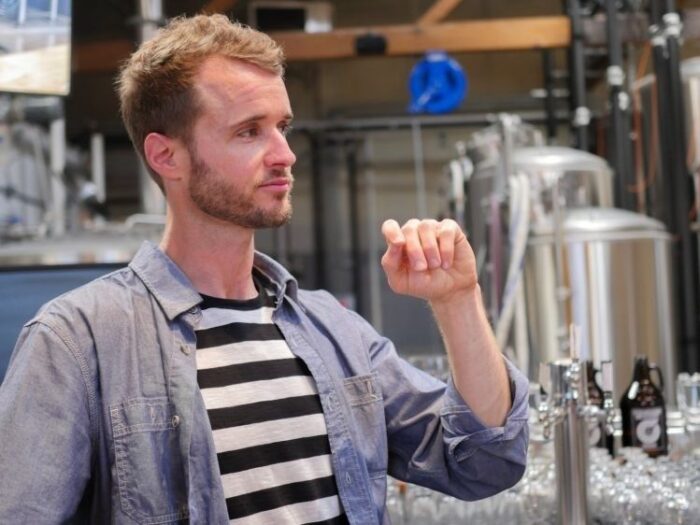Cultivated meat startup New Age Eats has made the “painful decision” to shut down after failing to secure funding to complete work on its pilot facility in Alameda, California, go through the regulatory process, and get its products in front of consumers.
Founder and CEO Brian Spears—who raised $25 million in a series A round in 2021 led by Korean firm Hanwha Solutions taking its cumulative funding to $32 million—revealed he had let go of the lease to the “90% complete” pilot manufacturing facility for cultivated pork in early January. Since them he has been seeking a buyer for the business, which he founded in 2018.
Ultimately, however, he had no choice but to throw in the towel, he told AFN Friday afternoon.
“We’ve spoken to many companies about acquiring the entire company, but ultimately those conversations were not successful given the ratio of assets to liabilities,” he said. “Although there is interest in acquiring our IP, which covers everything from cell lines to our machine learning platform, to media formulations.”
‘There’s no playbook for what we’re doing’
Venture capital money is geared towards backing companies in uncharted territory such as cultivated meat, said Spears, a chemical engineer with a background in industrial automation. However, the shift in capital markets beginning around spring 2022 has made life challenging for startups across the board, he said.
“There’s also been a softening on alternative proteins with public companies such as Beyond Meat and Oatly serving as proxies for an entire industry, which isn’t helpful. But you can’t fault investors for being more cautious in this environment; there’s no playbook for what we’re doing.
“As you increase scale, it costs more to validate what you’re doing at each stage, and then you’re in a chicken and egg situation.”
Asked whether the cultivated meat industry needed government funding to get off the starting blocks in the same way that governments have helped to support renewable energy or electric vehicles, he said: “If you look at what the alternative protein industry is trying to address, it’s climate change, deforestation, land and water use, antibiotic resistant bacteria, which are some of the major threats to humanity that you could say it is the role of governments to address.
“So from that perspective, you could say it’s worthwhile expenditure.”
Building a new industry ‘takes time and needs a lot of patient capital’
In a linkedin post penned earlier in the day, he said: “While our company will no longer survive, multiple companies will pick up the baton and use our technology to further our shared mission.”
He added: “Creating the experience of meat without slaughter is extremely difficult. We start with biotech borrowed from human health applications designed for high cost, low volume products. We worked to flip to low-cost, high-volume products. That is expensive, takes time, and needs a lot of patient capital.
“In our regulated industry, we can’t and won’t be able to sell for a while. Without revenue, we rely on other sources of capital,” added Spears.
“Investors proved to be the most efficient way to validate whether cultivated meat would be commercially viable. Unfortunately, with recent capital market turmoil, we have been unable to attract investment.”
The 23,000sq ft leased facility in the Research Park at Marina Village Alameda, features 13,000sq ft of manufacturing space and 10,000sq ft of food R&D labs and office space, said Blue Rise Ventures, a commercial real estate investor and operator and the landlord at the site.
Time horizons for cultivated meat
Speaking at the Tufts University Cellular Agriculture Innovation Day in December, multiple delegates highlighted the disconnect between the timelines venture capital firms typically operate by and the time it takes to get a completely new industry off the ground.
Uma Valeti, founder and CEO at California-based cultivated meat startup UPSIDE Foods told delegates that it “seems daunting and overwhelming when you think it could be 10, 20, 30 years [before cultivated meat really takes off]. But I don’t think that’s a long horizon at all when you think that meat [from slaughtered animals] has been around for thousands of years.”
While this is true, it presents a huge challenge for venture-backed startups that may run out of cash long before Americans start eating meat made in bioreactors en masse, said Amir Zaidman at The Kitchen FoodTech Hub in Israel.
Hence the shift in focus to investing in firms developing the ‘picks and shovels’ that will support the nascent industry as a whole, said Zaidman.
“Looking at it from the investor side, from the venture side, I would say that another company doing cultivated meat is no longer interesting unless you’re in China and you’re going after the Chinese market. What we’re looking for right now is the next generation of companies that will create the tools that will bring those companies to where they need to be… those enabling technologies.”





